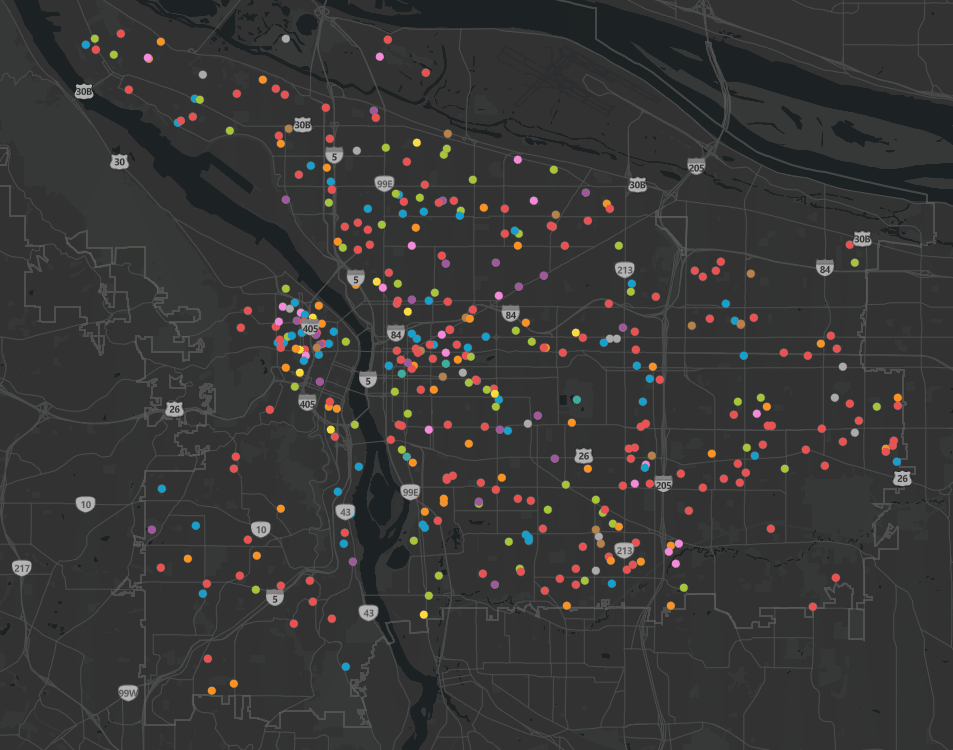Shhh: Here are Portland’s Quietest Neighborhoods

Updated 4/2023.
The idea of “home” usually brings to mind a sense of peace: it is ideally a place where we can relax and retreat from the outside world. We imagine entertaining friends outside without being interrupted by annoying sounds or sudden loud noises. Unfortunately though, the noise level of a neighborhood can often go undiscovered until it is too late.
If you are getting ready to buy a new home and finding a quiet neighborhood is high on your list of priorities, it is first important to understand how local authorities define “quiet”. According to the Portland Police Bureau, “No excessive noise is allowed in the City of Portland between the hours of 10:00pm and 7:00am.” You can find examples of possible noise complaints and submit a Portland noise complaint here.
However, that doesn’t always keep delivery trucks from backing up at 4 AM with loud beeping noises, partiers from playing music outdoors after midnight, or neighbors from picking up an evening game of pickleball (as in a case in the suburb of Lake Oswego).
Noise is a part of life in any city, but some parts of Portland are definitely quieter than others. While those born and raised in the big city don’t mind – and even desire – a bit of noise, others may need to seek out some relief for their health and sanity. Let’s jump into the fray about what noise pollution is, and what we can do about it when shopping for Portland real estate.
Noise Pollution, the Invisible Menace
Noise pollution, or excessive exposure to high-decibel sound, is real and only becoming more of a problem in today’s urban environments. Whether it’s leaf blowers and lawn mowers or jets passing overhead — or simply a loud HVAC system — noise can contribute to a number of stress-related problems including cardiovascular disorders, ulcers, and sleep disturbances. Research has even found connections between noise pollution and low birth weight. (Read more at EPA.gov)
Now that we’ve moved further from the start of the pandemic, many kids are no longer learning from home. But a large number of us are still working in home offices, never having returned to work in the traditional office environment. Now for an increased number of workers, home is the place we need to concentrate in order to be productive in our careers. This means that, in addition to being a nuisance, external noises now have the potential to distract from a productive day of work. Excess noise can lead to a number of issues, including an increase of physical and psychological stress, a reduction in productivity, and interference in communication.
With growing awareness about noise pollution and the desire to live in a quiet neighborhood being pretty much universal, it’s no surprise that even home values reflect the preference for quiet. In fact, high noise levels correspond with lower home values.
Noisiest Neighborhoods in Portland
Noise pollution can be split into two categories: The abrupt or alarming sounds that tend to get called in as noise complaints, and the constant background noise that comes from nearby freeways, airports, or industrial activity. Although the second type of noise pollution tends to be accepted as “part of the deal” for living in certain neighborhoods, it can turn up the decibels to a constant 80 dB in some residential areas, the equivalent of standing next to a vacuum. A Harvard study published in Environmental Health Perspectives found that this type of noise pollution tends to be the highest in low-income and racial minority neighborhoods, because these neighborhoods tend to be situated near industrial parks, roadways and airports.
This trend holds true in Portland. In fact, Northeast Portland, which contains many historically black neighborhoods, is not only directly adjacent to Portland International Airport, it is currently targeted for an expansion of the I-5, which residents say will increase noise pollution.
Aside from freeway and airport noise, other Portland neighborhoods might win the award for “noisiest” because they bring in a consistently high number of noise complaints, as viewed in the City of Portland’s noise complaint map. Unsurprisingly, the downtown Portland area “wins” for the number of noise complaints related to construction, loud music and amplifiers. Inner southeast Portland has a concentrated number of similar complaints as well.
Outside of the downtown area and southeast, the only noticeable pattern for where noise complaints appear is that the complaints follow main thoroughfares like Sandy Boulevard, Burnside St. and Division St., where bars and restaurants also tend to be clustered.
Finally, some have complained of wind noises from the Columbia River Gorge. Although these areas are outside the city of Portland, be aware that communities from Troutdale to Corbett may experience some naturally generated howls and gusts. While the noise level of wind may not be immediately apparent, long-term exposure to the sound can easily become an irritant.
Portland, Oregon Noise Complaint Map

Features of Quieter Neighborhoods in Portland
Okay, so where are the quietest neighborhoods in Portland? Just as certain factors can lead to a noisy neighborhood, there are environmental elements at work to help keep the quiet. One obvious note is that it is not possible for any area to be completely devoid of noise. That said, here is a list of the features of some neighborhoods that can help to mitigate noise levels.
- Distance. How far is the neighborhood from the nearest “point source” of noise, like a freeway, airport, construction site, or factory? It goes without saying that those sensitive to noise should seek to live along roads that are strictly residential, where unnecessary traffic is not likely to pass through. One might imagine that rural areas are quieter, but they can also be subjected to noise from farm equipment, logging operations, trains, or other activities.
- Density. Let’s face it: Humans are noisy. The more people living in a neighborhood, the louder it‘s going to be. Portland population densities range from over 15,000 people per square mile (in the Goose Hollow neighborhood near downtown) to the low hundreds of people per square mile, where homes are larger and/or farther apart. All other factors aside, the less populated an area is, the quieter it will be.
- Trees & greenery. Not only do trees actually absorb sound, they also create distracting “white noise” (rustling of leaves, birdsong etc.) that can help mask some of the more disturbing noises in your environment. The same is true of other types of greenery, like shrubs and bushes, etc.
- Culture. All types of neighborhoods generate noise; it may come down to the type of noise you prefer. For example, some neighborhoods may be overrun with the motivated 6 AM leaf blowers, while others might be silent through sunrise, but turn up the bass when the sun goes down. A good way to determine if your habits or noise preferences will mesh with an area where you are interested in buying a home is to spend time observing the neighborhood at a variety of times throughout the day and week. This will paint a helpful picture of the possible noise scenarios you might encounter while living there.
Here are our top picks for *quieter* Portland Neighborhoods:
- Northwest Heights. Situated above the massive Forest Park and with a population density of just 3500 people/square mile, Northwest Heights is about as quiet as you can get within the Portland city limits. It had zero noise complaints in the last year (as of this writing), and it’s a long (and winding) 4 miles to Highway 26, the nearest major road.
- Find available homes in Northwest Heights
- Southwest Hills. With many small parks and lower-density neighborhoods, this area of Portland is one of the quietest and most convenient, too. Although it is closer to the I-5, the hilly landscape and abundance of green space may help absorb some of the sound. While there were two noise complaints in the last year (one for music at a construction site during the day and one for piano playing at night), the overall layout and population distribution of the Southwest Hills neighborhood goes a long way toward creating a quiet atmosphere.
- Find available homes in Southwest Hills
- Roseway. Located in NE Portland, Roseway is a fairly quiet area. While it is comparatively a higher density neighborhood, it had relatively few noise complaints. And though it is situated closer to the airport, it manages to remain a peaceful pocket of Portland. The fact that the Rose City Golf Course borders the southern end of the neighborhood greatly contributes to reducing its noise levels.
- Find available homes in Roseway
- Sumner (Honorable Mention). While it is close to the airport and affected by environmental noise from planes, it has had zero noise complaints over the last year. If the occasional airplane overhead doesn’t bother you, this is a place you could call home without worry of loud interruptions.
- Find available homes in Sumner
Search for Quiet Portland Homes Online
Our real estate search engine, Portlandhomesforsale.com allows you to enter keywords in addition to other filters like area, price, and number of bedrooms. Try entering “quiet” in the Custom Keyword Search field and see what comes up! Even easier, ask our top 1% Portland buyers’ agents, and we’ll be happy to create a custom list of homes for you to browse. Give us a call today at 503-714-1111 or chat with the bot on this site. We’d love to connect!


